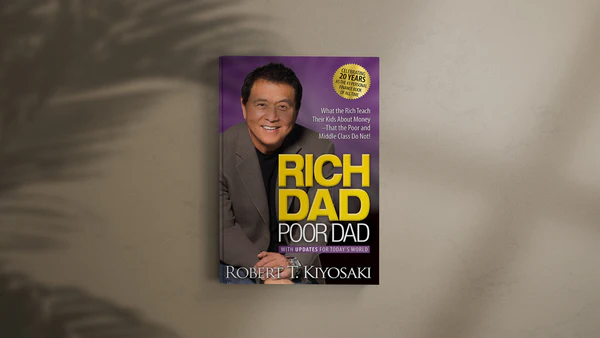Introduction
“Rich Dad Poor Dad,” written by Robert Kiyosaki, has become a cornerstone of personal finance literature since its release in 1997. Through a compelling narrative contrasting two father figures—his biological father (the “Poor Dad”) and the father of his best friend (the “Rich Dad”)—Kiyosaki presents essential lessons on wealth-building, financial literacy, and the mindset necessary for achieving financial independence. This blog aims to explore the book’s key themes, insights, and its impact on readers’ perceptions of money.

The Two Dads: A Contrast of Mindsets
The essence of Kiyosaki’s narrative lies in the contrasting philosophies of his two dads. The Poor Dad, educated and traditionally employed, represents a conventional mindset about money: work hard, earn a steady paycheck, save, and invest conservatively. Conversely, the Rich Dad embodies an entrepreneurial spirit, emphasizing financial education, investment, and the importance of assets over liabilities.
Key Themes
- Financial Literacy One of the most critical messages of “Rich Dad Poor Dad” is the importance of financial education. Kiyosaki argues that traditional schooling does not equip individuals with the necessary tools to understand money management. Instead, he advocates for self-education in finance, investing, and entrepreneurship. This theme resonates in today’s world, where financial literacy is increasingly recognized as a vital skill.
- Assets vs. Liabilities Kiyosaki introduces the concept of distinguishing between assets and liabilities, a pivotal principle in wealth-building. He defines assets as anything that puts money in your pocket—like investments and income-generating properties—while liabilities take money out—like personal residences and loans. This fundamental shift in thinking encourages readers to focus on acquiring assets that contribute to their financial well-being.
- The Importance of Entrepreneurship Kiyosaki’s Rich Dad often stresses the value of entrepreneurship. He believes that starting a business and investing in opportunities is crucial for achieving financial freedom. This perspective encourages readers to think outside the confines of traditional employment and consider the potential of creating their own wealth through innovation and risk-taking.
- Mindset and Attitude Toward Money The book delves into the psychological aspects of money management. Kiyosaki posits that a positive mindset toward money and wealth is essential for success. He challenges the societal norms surrounding money, suggesting that many people view it negatively due to fear or a lack of understanding. By shifting one’s attitude toward money, individuals can open themselves up to opportunities for wealth creation.
- Work to Learn, Not to Earn Kiyosaki advocates for gaining experience over simply earning a paycheck. He suggests that young people should seek jobs that teach valuable skills—like sales, communication, and management—rather than merely focusing on high salaries. This philosophy underscores the importance of personal growth and learning in one’s financial journey.
Practical Applications
While “Rich Dad Poor Dad” is rich in philosophy, Kiyosaki also provides actionable advice. Here are some practical applications of his teachings:
- Start Investing Early: The earlier you begin investing, the more time your money has to grow. Kiyosaki emphasizes the power of compounding interest and the benefits of investing in assets that appreciate over time.
- Diversify Your Income Streams: Relying solely on a job for income can be limiting. Kiyosaki encourages readers to explore multiple streams of income, whether through investments, side businesses, or passive income sources.
- Continuous Learning: The financial landscape is ever-evolving. Kiyosaki stresses the importance of staying informed and continuously educating oneself about market trends, investment strategies, and financial principles.
- Network and Build Relationships: Surrounding oneself with financially savvy individuals can lead to new opportunities and insights. Kiyosaki underscores the value of networking and learning from others’ experiences.
The Impact of “Rich Dad Poor Dad”
Since its publication, “Rich Dad Poor Dad” has sold millions of copies worldwide, influencing countless readers. Its straightforward, relatable approach to finance has made complex concepts accessible to a broad audience. The book has sparked discussions about financial literacy in schools and among families, emphasizing the need for a paradigm shift in how society views and teaches money management.
Kiyosaki’s work has also led to the development of a franchise that includes seminars, games, and additional books, creating a comprehensive platform for financial education. This expansion reflects the growing demand for knowledge in personal finance and entrepreneurship.
Criticisms and Controversies
Despite its popularity, “Rich Dad Poor Dad” has faced criticism. Some financial experts argue that Kiyosaki’s advice can be overly simplistic or that his emphasis on entrepreneurship overlooks the risks involved. Others have pointed out that his success story may not be replicable for everyone, leading to unrealistic expectations. Furthermore, some critics have questioned the accuracy of Kiyosaki’s anecdotes and the veracity of his claims.
Exploring Financial Mindsets: A Deep Dive into “Rich Dad Poor Dad”
“Rich Dad Poor Dad” serves as both a motivational guide and a practical handbook for those seeking to enhance their financial literacy and independence. Its core principles—financial education, asset acquisition, and a positive mindset toward wealth—remain relevant in today’s complex economic environment. While it’s essential to approach Kiyosaki’s advice with a critical mind, the book undeniably encourages readers to rethink their relationship with money and empowers them to take control of their financial futures.
Ultimately, whether you’re just starting your financial journey or looking to refine your strategies, “Rich Dad Poor Dad” offers timeless lessons that can inspire action and foster a mindset geared toward financial success.


